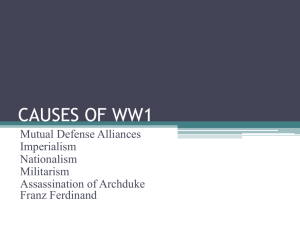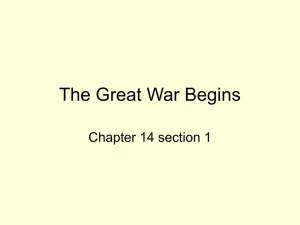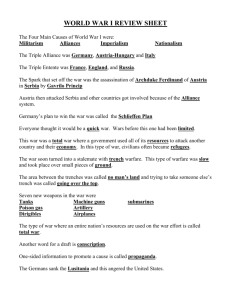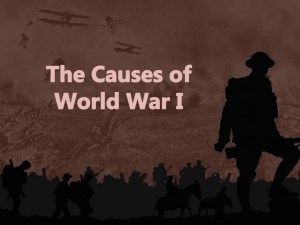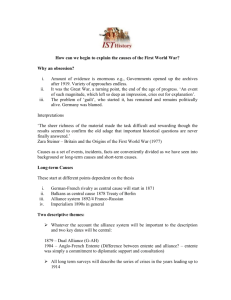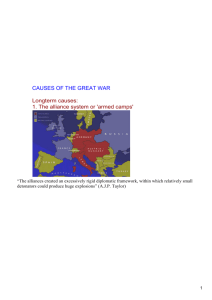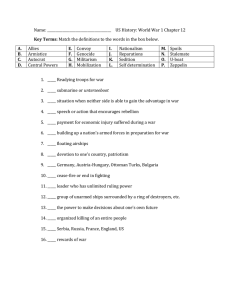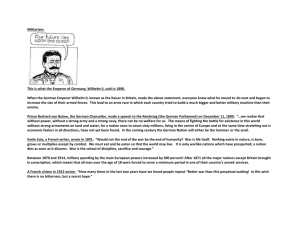File
advertisement
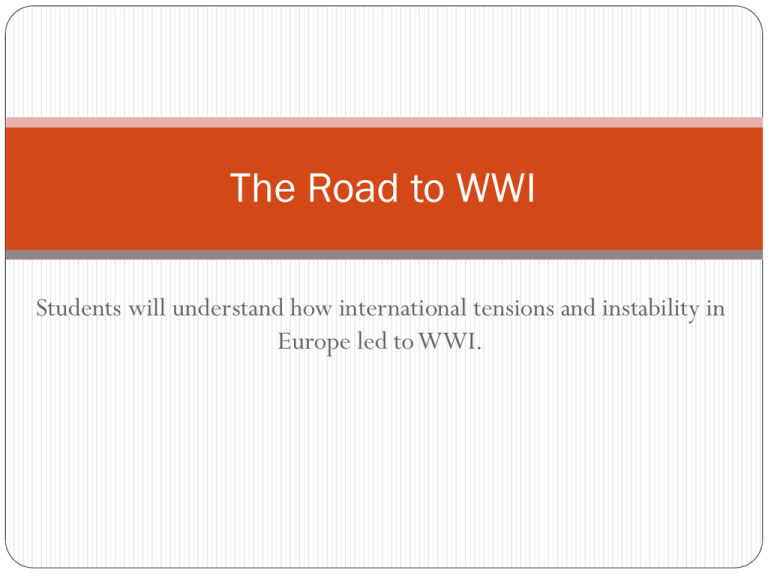
The Road to WWI Students will understand how international tensions and instability in Europe led to WWI. Why all the hostility? Triple Entente Imperial competition Anglo-German naval rivalry 1897- Germany launched a new naval program that scared Britain and challenged British superiority on the seas. Built 60 Battleships Forced concessions and gained territory Britain responds and builds the Dreadnought. Arms race is out of control by 1912 Commercial Rivalry Germany is dominating trade in South Africa, South America, and the Middle East with superior steel and iron. Leading creditor nation with loans to develop industries in colonial regions. Tariffs are established in British colonies to counteract German goods in region. Launches a “diplomatic revolution” between Britain and Germany beginning in 1907. “Made in Germany” by E.E. Williams (sound familiar?) Bosnian Crisis of 1908-1909 Russian defeat 1905- Austria tries to take advantage Austria attacks Serbia. Ottoman Empire threatened to retaliate Russia and Austria unite as European powers against Ottomans. Russian Roulette In “closed door” negotiations, Russia accepted Austrian control of the Bosnian region; however Russia failed to document this support. When Austria proceeds with annexation, Serbia perceives actions as threatening and appeals to other European powers for support. Austria prepares to go to war with Serbia with German support. Russia agrees to support Serbia against Austria France hesitant to support Russia because they are still trying to work out details of Moroccan negotiations. Russia backs down because they don’t want to go to war with Germany. Forces Serbia to concede Bosnia and cooperate with Austria. Until 1912… Italy invaded Libya Balkan region unite and attack Turkey Balkans succeed and strengthen territories… Balkan countries are empowered under Nationalistic movements. Balkan War of 1912 threatens the stability and peace of Europe. Why? Treaty of London 1913 (30 May) Bulgaria failed to take Constantinople and negotiated an armistice on December 3, 1912. On May 30, 1913, a new Treaty of London is negotiated; includes political boundaries for the Balkan countries. All Balkan territories are strengthened. 2nd Balkan War Bulgaria attacked Serbia. Greeks, Romanians, and Turks supported Serbia against Bulgaria. Treaty of Bucharest signed Treaty of Constantinople signed Austria is weakened Petty action: Big Consequences On 28 June 1914, the Serbian terrorist “Black Hand” group member, (Gavrilo Princip) assassinated Archduke Franz Ferdinand and his wife. No love lost by Emperor Franz Joseph; however, assassination gave Emperor the excuse he needed to attack Serbia. Anticipated no European power would intervene because Serbia assassinated Austrian royalty (Remember reaction to French Revolution). Gained immediate support from Germany (European royalty). (Blank Cheque policy) Ultimatum for War = Chain reaction 7 July 1914: Austria issued an ultimatum to Serbia with unrealistic demands to allow Austria control of Serbian security forces (military) in order to institute anti-terrorism measures. Serbia refused to cooperate or meet demands. 28 July 1914: Austria declares war on Serbia. Alliance system is activated. 28 July -- Russia orders mobilization 31 July – Germany issues ultimatum. 31 July – France responds under Dual Alliance. Britain refuses to commit. 1 August– Germany declares war (defensive) 1 August -- Germany submits ultimatum to Belgium (Schiefflen Plan) Belgium does not respond 2 August -- Germany invades Belgium to activate the Schiefflen Plan 3 August – Britain issues ultimatum. Germany fails to respond 4 August --Britain declares war against Germany Choose one of the questions below Germany was the first to issue an official declaration of war. Discuss the role Germany played in causing the war. Are they to blame for the war? In 1914, a mismanaged Balkan crisis caused the powers to stumble into a general European war which had been avoided in 1908 and 1912. To what extent do you agree with this view? No one power alone bears the chief responsibility for the causes of the First World War. To what extent do you support this statement?
